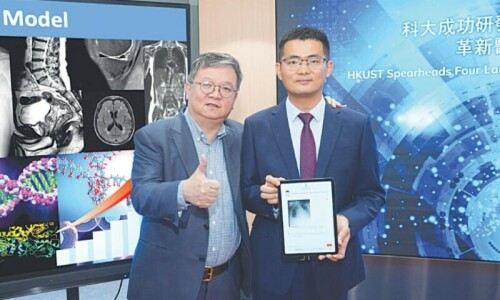The Hong Kong University of Science and Technology (HKUST) announced that four AI medical models, one of which is a “medical ChatGPT,” can assist in diagnosing up to 30 types of cancer and other diseases and potentially cut diagnosis times by up to 40%.
MedDr, an AI medical generalist similar to a “medical GPT,” was introduced by Chen Hao, assistant professor in the HKUST Department of Computer Science who leads the pioneering project.
Chen explained that the AI tool can use medical images to generate reports and provide initial diagnoses. This enables users to submit close-up images for analysis and receive treatment recommendations from the chatbot.
Chen stated that he hoped the model could save doctors between 30% and 40% of their time, thereby significantly increasing their productivity and allowing them to handle more valuable tasks.
Chen went on to say that the university will work with nearby hospitals and talk to more doctors to make sure the tool is accurate.
MedDr is one of the largest open-source software developments in general medicine, as stated by HKUST. It is recognized as one of the best generalist models currently in use by a recent study by the Shanghai AI Laboratory.
MOME, an additional AI model, focuses on diagnosing breast cancer, one of Hong Kong women’s most common cancers.
According to Chen, it helps doctors quickly distinguish between benign and malignant breast tumors when analyzing patients’ breast MRIs, potentially avoiding unnecessary pathological biopsies.
Chen added that this model can also predict how chemotherapy will affect a patient, making it easier to come up with effective treatment plans.
Chen mentioned that this model’s system accuracy can surpass that of radiologists with five years or more of experience, with a rate of more than 90%. Partnerships with five mainland Chinese hospitals and the analysis of over 10,000 patient cases made this achievement possible.
The pathology assistant tools mSTAR and XAIM, which examine how AI medical systems make decisions, are also included in the four models.
According to HKUST, the university’s AI computing resources were utilized in the AI model research. These AI medical systems are able to process a lot of data and perform exceptionally well if they have sufficient arithmetic power.
At the same media briefing, university provost Guo Yike described this as the first concrete step toward modernizing healthcare.
He stated that AI-integrated modern healthcare is a significant future direction for the university and that HKUST is actively pursuing the establishment of Hong Kong’s third medical school.



